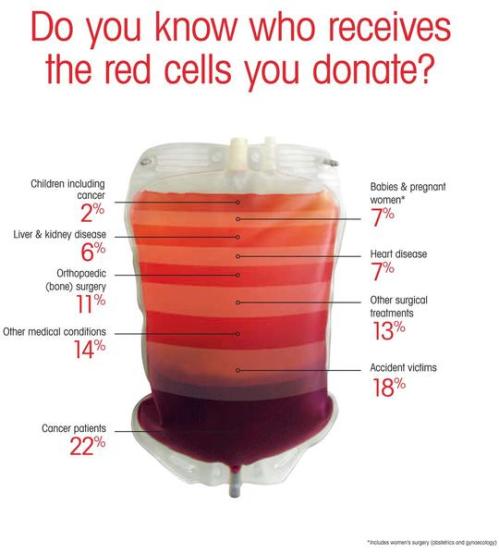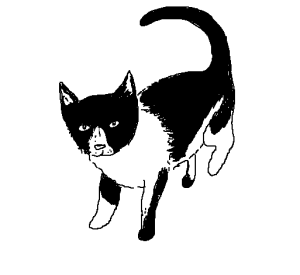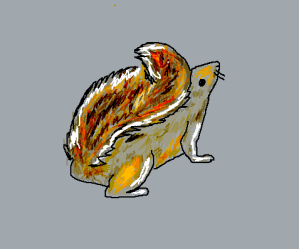I have never donated blood, but this is something that I’d like to change. According to the NHS (National Health Service in the UK), blood can only be stored in hospitals for a relatively short time- 35 days for red blood cells, and only 5 days for platelets! Hence stocks need to be replenished constantly. In England, 7000-8000 people donate blood every day. Apparently, only 4% of people in England give blood regularly; the remaining 96% certainly depend on them! Blood transfusions are needed for people with severe anaemia, people with thalassaemia & sickle cell anaemia, pregnant women suffering from complications such as haemorrhage or ectopic pregnancies, some cancer patients, patients undergoing major surgery, as well as people who experience significant blood loss from an accident. The approximate proportions are outlined in the image below.
Bone marrow is the soft jelly-like tissue found within certain bones in your body. Stem cells are created in the bone marrow and they can differentiate into white blood cells and red blood cells. It is these stem cells that are important to individuals who have problems with their bone marrow such as people suffering from leukaemia or other immune diseases. According to the British Bone Marrow Registry, in 30% of these patients, a matched donor can be found within the patient’s family. The other 70% rely on a matched donor volunteer. The reality is that many people who need bone marrow donations die every year because there are not enough donors. A bone marrow register is a list of people who are willing to donate bone marrow if required. There are two bone marrow registers in England, the Anthony Nolan register, a charity & the British Bone Marrow Register (which is part of the NHS). To join the register, a blood sample is taken and your tissue type is identified. I have been on the register for two years, but I have not been asked to donate; it all depends on if your tissue type matches with the individual in need. I was initially a bit apprehensive about being on the register, because apparently your hips sometimes feel sore afterwards (bone marrow is often taken from the pelvis under general anaesthetic). However, saving someone’s life is a great incentive to put up with a little bit of discomfort! More commonly, bone marrow cells are taken from circulating blood, which is not done under anaesthetic and is similar to giving blood. If you are interested in joining the bone marrow register, speak to a nurse next time you donate blood.
According to the NHS, only 29% of people in the UK have joined the organ donor register. Organs that can be donated after death include the lungs, kidneys, liver, heart, pancreas and small intestine, as well as tissues such as corneas, skin, bone, tendons, cartilage and heart valves. Recently, driving license applicants must answer a compulsory question regarding whether they wish to donate their organs after death. I think that is a very good thing, because it gets the public thinking about this important issue. In the UK, 1000 people die each year (in other words, 3 people per day) because there are not enough organs available. There is an ever increasing demand for transplants, partly caused by less healthy lifestyles e.g. adult onset diabetes associated with kidney failure. I was a little apprehensive initially about being on the organ donor register, but I now feel very comfortable with it; one day, many individuals will benefit from my donation.
There is a need to boost donor register membership among black and Asian communities, which comprise less than 2% of the register but more than a quarter of those awaiting transplants. This is because people from these communities are more likely to develop diabetes and high blood pressure, both of which are major causes of kidney failure.
I feel very passionate about this issue, and I would strongly encourage others to consider blood, bone marrow and organ donation. It is a very kind and easy way to help society. I really can’t imagine the pain that patients urgently requiring transplants must be going through; it must be horrific.
Further info can be found at
http://www.nhsbt.nhs.uk/bonemarrow/


